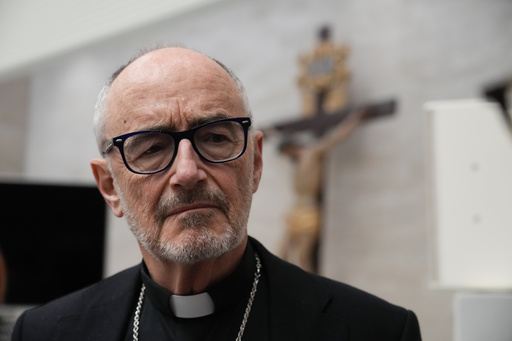
VATICAN CITY — On Monday, the Vatican’s charitable organization expressed concerns about the U.S. government’s proposed cuts to USAID, labeling the move as “reckless” and warning that it could lead to the deaths of millions. Cardinal Michael Czerny, a leading figure in Pope Francis’ initiatives on development and social issues, urged the Trump administration to reflect on Christian teachings regarding the care of others.
Czerny, a Canadian Jesuit from the Czech Republic, oversees the Vatican office tackling issues related to migrants, environmental concerns, and development through Caritas Internationalis, the church’s charitable arm. Caritas issued a warning indicating that the severe decision to slash USAID funding could result in millions facing extreme hardship, while condemning hundreds of millions more to “dehumanizing poverty.”
USAID, which represents the U.S. government’s primary agency for international humanitarian and development aid, managed over $40 billion in funding in 2023, constituting roughly 40% of the global aid budget. The Trump administration, alongside supporters like Elon Musk, has aggressively targeted USAID in their spending review, leading to a substantial halt in most of its programs globally. This freeze has been temporarily paused by a federal judge, who has ordered a stoppage in the removal of many agency staff.
In a recent interview, Cardinal Czerny stated that while every government has the entitlement to review its foreign aid programs, dismantling an agency after prior financial commitments is problematic. He noted, “There are programs underway and expectations and we might even say commitments, and to break commitments is a serious thing.” He emphasized the need for proper warning to allow other funding sources to be identified.
Catholic Relief Services, a significant beneficiary of USAID funds and the Catholic Church’s aid agency in the U.S., has raised alarms about the ramifications of the budget cuts. Other Caritas programs on various levels are also likely to feel the impact, directly or otherwise, as pointed out by Czerny.
Caritas has called on governments worldwide to urge the U.S. administration to reconsider its stance. In their statement, they underscored the critical role of USAID in providing essential services, cautioning that halting its support would drastically undermine humanitarian efforts established over decades and push millions into poverty or peril.
Despite its considerable budget, Czerny noted that USAID’s financial provisions account for less than one percent of the U.S.’s GDP, a minor fraction compared to the biblical directive of tithing ten percent of one’s income.
Czerny acknowledged Pope Francis’ criticisms regarding Western aid often being conditional in ways that conflict with Catholic teachings. The present administration, in its drive to reduce funding, is focusing on programs perceived as “woke.” He remarked, “If the government thinks that its programs have been distorted by ideology, well, then they should reform the programs,” advocating for reform as the preferable course over shutdowns.
Additionally, the Vatican has expressed concern over the administration’s strict immigration policies. White House Press Secretary Karoline Leavitt recently reported that more than 8,000 individuals have been apprehended in immigration enforcement actions since Trump’s inauguration. Some of these individuals are being detained in federal facilities or at Guantanamo Bay.
Czerny criticized this crackdown, stating, “A crackdown is a terrible way to administer affairs and much less to administer justice.” He expressed sorrow for those who are being harmed and genuinely distressed by these measures, sharing his perspective shaped by his family’s experience as refugees post-World War II.
The U.S. Conference of Catholic Bishops issued a strongly worded statement in response to the administration’s early executive orders, indicating their grave concerns regarding the treatment of immigrants and refugees, foreign aid cuts, and environmental policies, stating that these actions would have detrimental effects on vulnerable populations.
With a biblical mandate to “welcome the stranger,” Pope Francis has made accommodating migrants a central focus of his papacy, emphasizing the need for nations to protect and integrate those fleeing dire situations. Czerny remarked that, aside from a few exceptions, most nations have the capacity to extend help, placing the responsibility on people to act as compassionate citizens, believers, and particularly as Christians.

